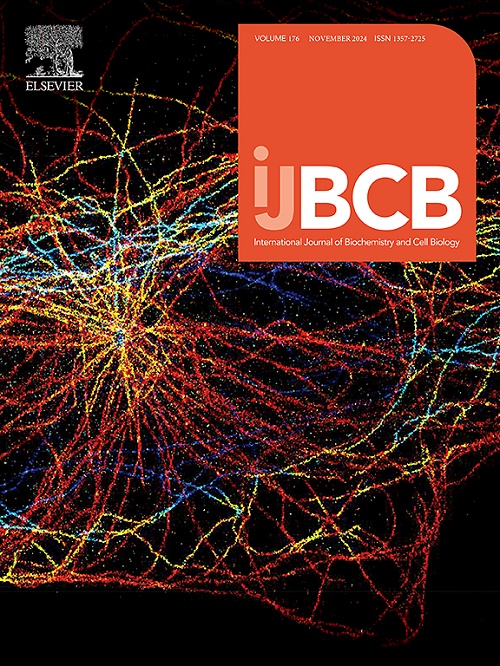ARHGAP11A is a potential prognostic biomarker and therapeutic target for pancreatic adenocarcinoma
IF 2.8
3区 生物学
Q2 BIOCHEMISTRY & MOLECULAR BIOLOGY
International Journal of Biochemistry & Cell Biology
Pub Date : 2025-05-19
DOI:10.1016/j.biocel.2025.106804
引用次数: 0
Abstract
The prognosis of pancreatic adenocarcinoma remains dismal up to now, partly owing to a lack of clinically feasible therapeutic targets. ARHGAP11A, a member of Rho GTPase-activating proteins family, has been reported as a prognostic biomarker and oncogene for multiple cancers. However, the specific effects of ARHGAP11A in pancreatic adenocarcinoma remain obscure. In this study, we explored and validated the oncogenic role of ARHGAP11A in pancreatic adenocarcinoma via thorough bioinformatics analyses of public databases and our own RNA-seq data, and in vitro experiments. We found that ARHGAP11A was significantly upregulated in pancreatic adenocarcinoma and correlated with poor clinical outcomes of pancreatic adenocarcinoma patients. Functional enrichment analyses revealed that ARHGAP11A-related genes were enriched in pathways of cell cycle and cell apoptosis. Further molecular functional experiments on ARHGAP11A knockdown pancreatic adenocarcinoma cell lines demonstrated that ARHGAP11A knockdown significantly inhibited cell proliferation, promoted cell cycle arrest in the G1/S stage, and induced cell apoptosis. In comparison, overexpression of ARHGAP11A could remarkably promote the proliferation, cell cycle progression, and apoptosis resistance of pancreatic adenocarcinoma cells. In conclusion, our study demonstrates that ARHGAP11A plays an oncogenic role in pancreatic adenocarcinoma, thus providing a novel therapeutic target and prognostic biomarker for patients with pancreatic adenocarcinoma.
ARHGAP11A是胰腺腺癌潜在的预后生物标志物和治疗靶点
胰腺腺癌的预后至今仍不容乐观,部分原因是缺乏临床可行的治疗靶点。ARHGAP11A是Rho gtpase激活蛋白家族的一员,已被报道为多种癌症的预后生物标志物和癌基因。然而,ARHGAP11A在胰腺腺癌中的具体作用尚不清楚。在本研究中,我们通过对公共数据库和我们自己的RNA-seq数据进行深入的生物信息学分析,以及体外实验,探索并验证了ARHGAP11A在胰腺腺癌中的致癌作用。我们发现ARHGAP11A在胰腺腺癌中表达显著上调,并与胰腺腺癌患者临床预后不良相关。功能富集分析显示,arhgap11a相关基因富集于细胞周期和细胞凋亡通路。对ARHGAP11A敲低的胰腺腺癌细胞进行的分子功能实验表明,敲低ARHGAP11A可显著抑制细胞增殖,促进G1/S期细胞周期阻滞,诱导细胞凋亡。相比之下,ARHGAP11A过表达可显著促进胰腺腺癌细胞的增殖、细胞周期进展和凋亡抵抗。综上所述,我们的研究表明ARHGAP11A在胰腺腺癌中具有致瘤作用,从而为胰腺腺癌患者提供了新的治疗靶点和预后生物标志物。
本文章由计算机程序翻译,如有差异,请以英文原文为准。
求助全文
约1分钟内获得全文
求助全文
来源期刊
CiteScore
8.10
自引率
0.00%
发文量
124
审稿时长
19 days
期刊介绍:
IJBCB publishes original research articles, invited reviews and in-focus articles in all areas of cell and molecular biology and biomedical research.
Topics of interest include, but are not limited to:
-Mechanistic studies of cells, cell organelles, sub-cellular molecular pathways and metabolism
-Novel insights into disease pathogenesis
-Nanotechnology with implication to biological and medical processes
-Genomics and bioinformatics

 求助内容:
求助内容: 应助结果提醒方式:
应助结果提醒方式:


